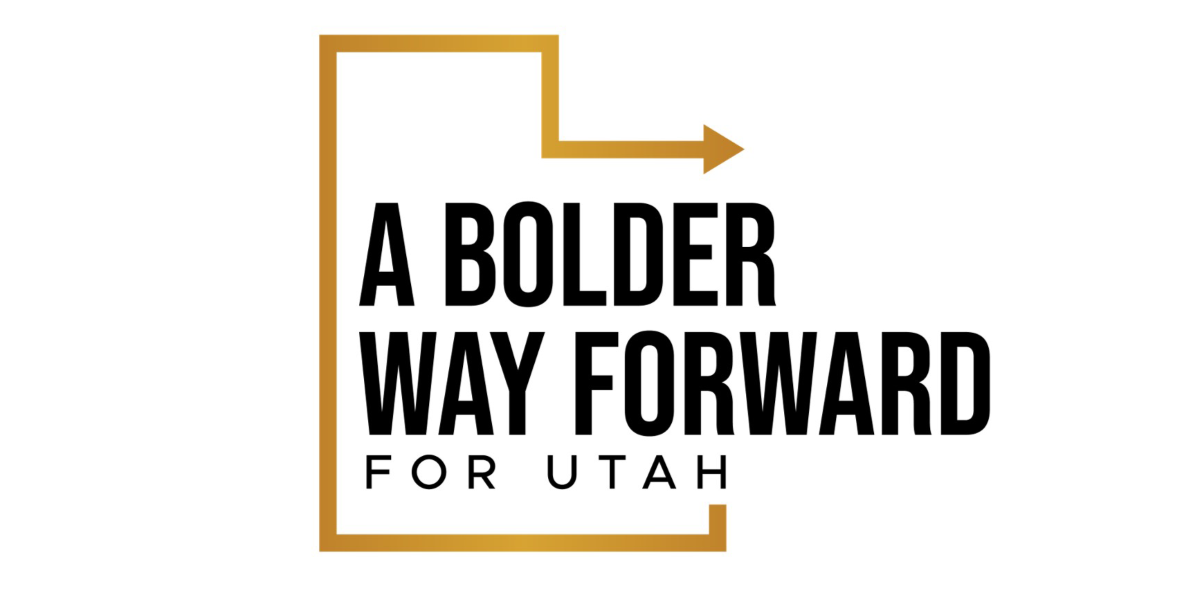
Public Policy 
For the 2024 General Session of the 65th Utah Legislature (January 16 to March 1), A Bolder Way Forward (BWF) Spoke Leaders have requested that we highlight proposed legislation that may impact Utah women and girls, specifically as it relates to the mission of the BWF movement. Per Spoke Leaders’ requests, included below are the bills and appropriation requests that they’ve brought to our attention. To learn more about these bills and their potential impact, we recommend visiting le.utah.gov or utahpolicy.com. To join in the efforts of a BWF, complete the Participant Interest Survey.
HB 96 - Child Care Program Sales Tax Exemption (Sponsor Rep Christine F Watkins): This bill would create a sales tax exemption for construction of a new childcare center or expansion of an existing child care center. Our spoke supports this work as it facilitates and incentivizes expansion of available childcare slots in response to the 65% gap between the needs of Utah’s working families and the capacity of licensed programs.
HB 153 - Child Tax Credit Modifications (Sponsor Rep Susan Pulsipher): This bill expands the Child Care Tax Credit to include children ages 4-5. A substitute has been made public with a new section added to the bill that increases the number of children unlicensed childcare providers can look after to eight unrelated children. This is not best practice and would be taking a big step backwards for Utah. Deregulation is not the answer to our childcare crisis.
SB 176 Child Care Services Amendments (Sponsor Sen Luz Escamilla): This bill aims to improve child care services by creating a public/private program in which state-owned spaces will be retrofitted to serve as expanded child care facilities and private companies will then have the opportunity to partner with a licensed provider in order to offer child care spots to private employees, state employees and members of the community. Our spoke supports this model of employer-based, state-assisted childcare services as it benefits Utah families, employers and the economy as a whole.
Lethality Assessment Impact Funding: Secure ongoing funding for state-licensed domestic violence service providers to help address a significant increase in victim referrals from law enforcement as a result of 2023 lethality assessment legislation (SB 117).
Family Court Improvements (bill info pending): Improve family court response to domestic violence in divorce and custody cases through enhanced standards for children’s safety, more involvement from domestic violence experts, and additional training for court personnel.
Accessible Housing: Advocate for resources and policies that increase access to safe, sustainable housing for domestic violence survivors.
HB 272 - Om's Law: Keeping Children Safe From Family Violence Act is an important milestone in family court reform in Utah. Om's Law is modeled after Kayden's Law, part of the federal Violence Against Women Act (VAWA) that was reauthorized again in 2022 to include provisions for states to adopt stronger family court reform. Om was a teen boy in Utah, and Kayden was a little girl in Pennsylvania, both killed by unsafe parents during court-ordered parent time.
This bill increases child safety by requiring that courts must first consider all safety risks (including evidence of domestic violence) in determining children’s best interest in custody and parenting cases. It also limits expert testimony in family court to qualified and credentialed professionals, implements guidance and limits on family court use of reunification treatment, and increases training for family court personnel.
HB 257 – Sex-Based Designations for Privacy, Anti-Bullying, and Women’s Opportunities (Rep. Kera Birkeland, Sen. Daniel McCay) – The Governor has signed this bill. The bill defines “female” and “male.” The bill also defines “men’s restroom as “a restroom that is designated for the exclusive use of males and not females” and defines “women’s restroom” as “a restroom that is designated for the exclusive use of females and not males.” Requires that each government entity shall ensure the preservation of distinctions on the basis of sex that protect individual privacy and competitive opportunity, as described in this 63G, Chapter 31. For sex-designated changing rooms open to the general public in publicly owned facilities, requires individuals to use the changing room that corresponds to their sex at birth (as defined in the bill). Makes exceptions for when an individual has undergone a primary sex characteristic surgical procedure and has amended their birth certificate, as well as those accompanying dependents who need assistance, those engaging in cleaning or maintenance services, etc. Requires government entities to ensure new construction includes single-occupancy privacy facilities and to consider the feasibility of retrofitting existing spaces to include methods of improving individual privacy in privacy spaces.
HB 261 – Equal Opportunity Initiatives (Rep. Katy Hall, Sen. Keith Grover) — The Governor has signed this bill. It applies to the public education system, higher education, and governmental employers. Prohibits institutions from engaging in certain prohibited practices, including requiring certain submissions before, during, or after admission or employment and requiring individuals to attend certain training that promotes differential treatment. Prohibits institutions from operating offices named diversity, equity, and inclusion and prohibits institutions from establishing or maintaining an office, division, employment position, or other unit of an institution established to implement, develop, plan, or promote campus policies, procedures, practices, programs, or initiatives, regarding prohibited discriminatory practices. Makes exceptions for the need to comply with federal law, state law, and certain grant, athletics, and accreditation requirements. Prohibits institutions from considering an individual’s personal identity characteristics in determining receipt of state financial aid, including waivers, but excluding private scholarships. Requires institutions to ensure all students have access to programs that provide student success and support. Requires institutions to develop strategies to promote viewpoint diversity and establish policies and procedures to include opportunities for education and research on free speech and civic education. Requires institutions to annually train employees on the separation of personal and political advocacy from an institution’s business and employment activities. Requires the Board to contract with a third party to conduct a campus climate survey. Requires the Board of Higher Education to monitor and report on compliance.
HB 22 – Concurrent Enrollment Revisions (Rep. Val Peterson, Sen. Lincoln Fillmore) — Expands the PRIME program eligibility by adding participation in a youth apprenticeship to the list of options for qualifying for the TRANSFORM certificate. Removes the previously specified scholarship amount ($500) of a TRANSFORM certificate and requires the Utah Board of Higher Education to determine the scholarship amount based on the number of eligible students and appropriations made by the Legislature. HB 22 passed both the House and Senate.
HB 287 – Advanced Degree Scholarship Program (Rep. Carol Spackman Moss) — Enacts an advanced degree scholarship program for educators who pursue advanced degrees in education and grants the State Board of Education rulemaking authority to create and administer the program.
HB 506 – Higher Education Residency Amendments (Rep. Marsha Judkins) – Provides that individuals on U and T nonimmigrant status, and those who can provide evidence they have applied for U and T visas, may qualify for resident tuition at USHE institutions.
SB 206 – Young Adult Service Fellowship (Sen. Ann Millner) - Creates the One Utah Service Fellowship to provide a one-year service opportunity to Utah high school graduates. Provides participants a living stipend and a tuition award, as well as guidance on educational, training, certification, and apprenticeship opportunities. This bill has been sent to the Senate Education Committee.
SB 223 – Youth Fee Waiver Amendments (Sen. Jen Plumb) – Requires the Utah Board of Higher Education to create policies requiring USHE institutions to waive transcript fees for students under the age of 26 who are experiencing homelessness, whose primary nighttime residence is not designed for or ordinarily used as a sleeping accommodation, who are in the custody of the Division and Child Family Services, or who were in the custody of DCFS but aged out of the program.
SB 0097 - Public Contract Requirements: This bill has potentially negative impacts on the spoke that will likely disproportionately affect women. The bill prohibits a public entity from entering into a contract with a company that engages in boycott actions and prohibits a person from penalizing a company that agrees not to engage in certain boycott actions while under contract with a public entity.
Rep. Clancy’s Sexual Assault Prevention Appropriations Request: This funding request will allow the 14 rape crisis centers and other frontline service providers engaging in sexual assault prevention to provide primary community prevention and education with community programs including schools, faith-based organizations, private businesses, and civic organizations.
HB 327 - Limitations on the Use of Polygraphs: This bill limits the use of a polygraph on a victim of a sexual offense.
HB 114 – Rape Crisis and Services Center Amendments: This bill creates standards of care for a rape crisis and services center. This is critical to ensure that victims of sexual assault are able to receive quality services, free of charge, anywhere in the state. It ensures a comprehensive and effective response for victims of sexual assault. It also ensures that victims receive care from trained and confidential advocates.
HB 55 - Employment Confidentiality Agreements: This bill impacts spoke goals by making void and unenforceable nondisclosure and non-disparagement clauses (confidentiality clauses) that prevent an employee from discussing or disclosing sexual assault, sexual harassment, or the existence of a settlement agreement resolving a sexual assault dispute or sexual harassment dispute; or making a negative statement about the employer related to a claim of sexual assault or sexual harassment. It also prohibits retaliation against an employee.

